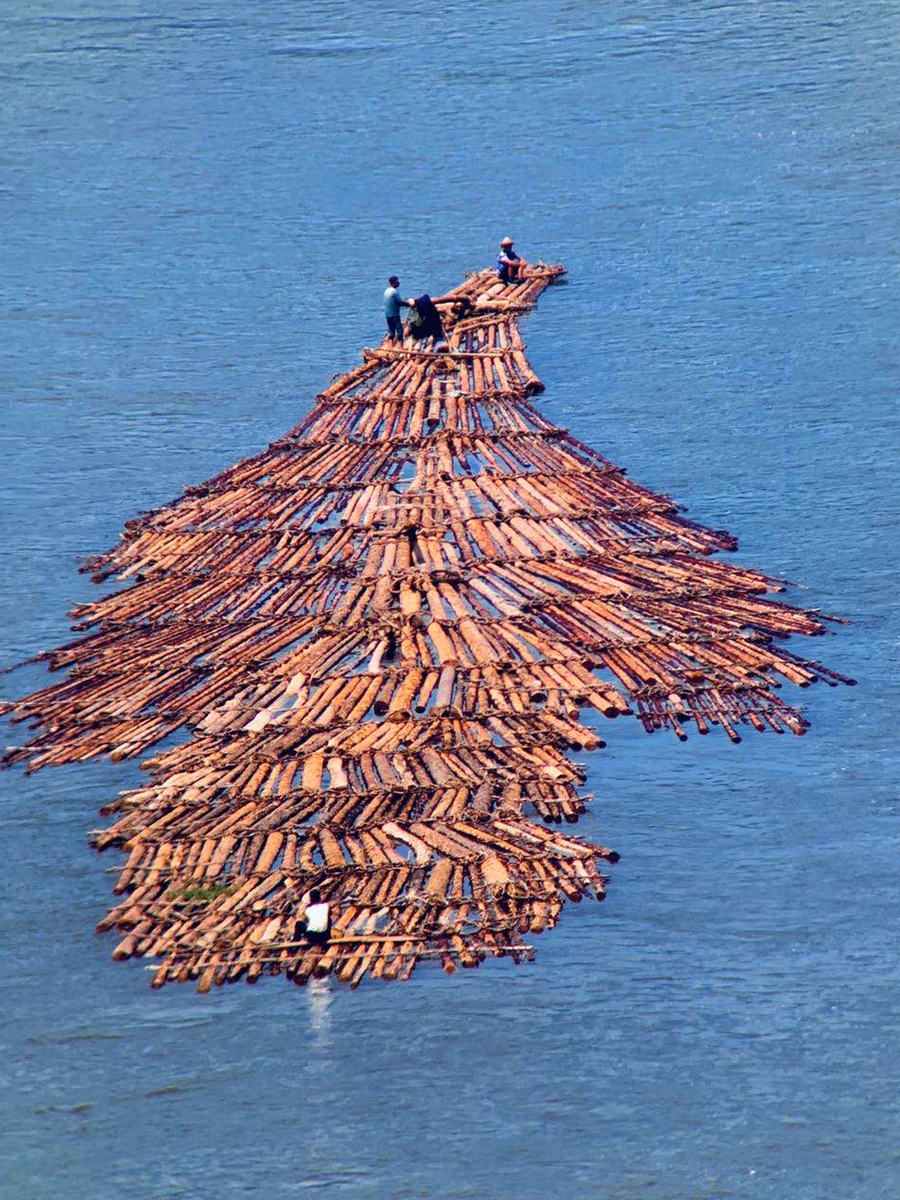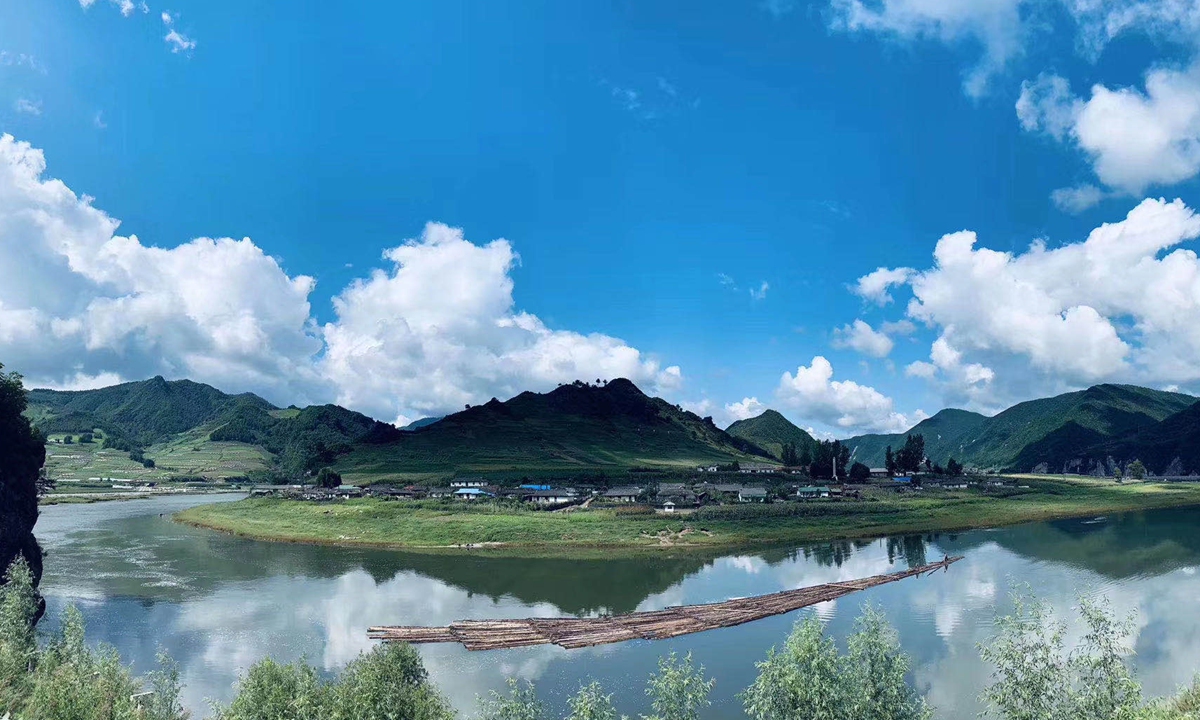River rafting loggers on China-North Korea border gain internet fame on Chinese social media
By Chen Xi Source: Global Times Published: 2020/7/30 17:00:22 Last Updated: 2020/7/30 18:00:22

North Korean loggers paddle a raft made of logs down the Yalu River. Photo: Courtesy of Vlogger Liu

North Korean loggers paddle a raft made of logs down the Yalu River. Photo: Courtesy of Vlogger Liu
On one side of the Yalu River, a border river separating China and North Korea, Chinese photographers can be seen moving around heavy photography equipment as they wait to capture an upcoming heart-stopping scene; while on the other side of the internet, millions of Chinese netizens also wait in excitement as they anticipate the appearance of the brave water warriors from North Korea who paddle a raft made of logs down the swift river.Those North Korean loggers, with their strong and vigorous bodies and tanned skin, have become internet celebrity in China, earning themselves the title of "The Gods of the Sea." Some local tour guides even offer charter car services for tourists from other provinces who want to see the North Korean masters with their own eyes.
Ancient occupation
These North Korean workers are engaged in an ancient but dangerous occupation - transport lumber down the river by using rattan ropes, steel cables or iron chains to turn them into large log rafts that they then ride down the river.
Originated from China's Spring and Autumn Period (770 BC-476 BC), "This means of ancient timber transportation has almost died out except in North Korea due to the development of modern transport," a vlogger surnamed Liu who has been filming the North Korean loggers for the past two years, told the Global Times.
Liu said he wanted to record this special mode of transportation as it is an intangible cultural heritage.
According to Liu, timber from the Changbai Mountain is tied into wooden rafts and then transported by these workers nearly 300 kilometers from North Korea's Ryanggang Province to Manpo in Chagang Province. Once it gets there, the wooden rafts are disassembled and the wood is loaded onto trucks and trains for transport to construction sites and lumber mills.
Liu pointed that the loggers must wait for the water to become deep enough to transport the wood; otherwise they risk being capsized by submerged rocks on the riverbed.
This is a high-risk occupation as a logger can be seriously hurt or killed if they don't maintain good control of their craft. Because of that, they are well-paid compared to other jobs in North Korea, with wages running around 300 KPW (33 cents) per day.
Liu said that before the COVID-19 pandemic, the workers had a pass certificate that allowed them to stay on the Chinese side of the river bank during the day, and he once helped provide first aid to a logger who broke his finger while rafting the river. Since Liu lives close to the Yalu River, he learned how to speak Korean as a young boy and so can communicate with the North Korean loggers without any difficulties.
According to some videos on Chinese short video platform Kuaishou, some Chinese often throw food and drink to these passing workers or invite them to enjoy a meal at certain resting spots.
"They eat rice mixed with corn and sorghum and some pickles and pickled fish. Fruits are a luxury food that they never dared imagine they could eat," he said.
At first, these workers were shy about being filmed, but eventually they began waving at the cameramen and repeatedly yelling "Hello, how are you?"
"We have built a very deep friendship," Liu said.
Surprising popularity
Growing up near the Yalu River, many photographers like Liu have watched these North Korean loggers since they were kids, so they had never imagined when they uploaded videos of them that they would gain such a following.
"Chinese netizens are very curious about North Korea, and videos about the country are always very popular," Bianjingxiaoyi, a vlogger with around 240,000 fans on Douyin (TikTok), told the Global Times.
These brave water heroes remind some Chinese netizens of the jobs their parents or grandparents once carried out.
"My grandpa was in this business in the 1980s. I remembered I once begged him to take me with him, but now I understand grandpa's solemn expression at that time," one Chinese netizen wrote on Douyin.
Some commented that these tough river voyagers who were able to quickly turn to and from among the rapids made them aware of the greatness of human beings.
"I was moved to tears while watching these videos," another netizen posted.
Liu said most of the fans of his channel expressed surprise after they learned how much these loggers make, but he noted that 300 KPW per day is much higher than the wages earned in many other occupations in North Korea.
"North Korean people are very kind, united and hard-working," Wang Xueming, a part-time photographer who has posted many videos about North Korea on Douyin, told the Global Times.
Newspaper headline: Surfing the rapids
Posted in: MISCELLANY,CULTURE & LEISURE,ARTS FOCUS